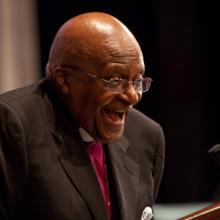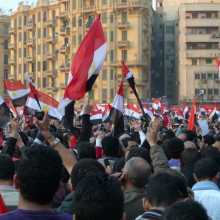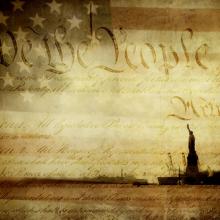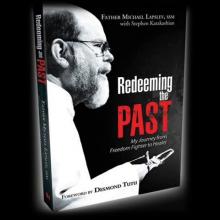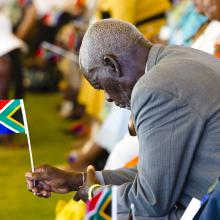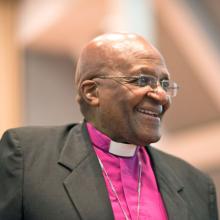South Africa
In the fall of 1981 I was a freshman at the University of California, Davis. It didn’t take long for me to step into the “Free South Africa” divestment movement sweeping the U.C. system.
I already had some traction with political protest. My first “demonstration” that I can remember was the 1966. I was 3 years old and it was the United Farm Workers march on the California state capitol in Sacramento. I was — and still am — a child of La Causa.
The University of California system had billions of dollars invested in South Africa — as did many U.S. and international corporations and governments. The aim of the divestment movement was to “drain the swamp of the apartheid regime.” The African National Congress and the South African church movement were calling for divestment and sanctions against the South African apartheid regime — even though it would but additional burdens on ordinary people. Millions around the globe responded.
The divestment movement spread like wildfire through the U.C. system. We had regular noon rallies outside the administration offices. And more than once in my college career we blocked the steps to Sproul Hall and were subsequently arrested by campus police with the Davis city police looking on.
When he was asked how he would like to be remembered, former president Nelson Mandela was very clear: “I would like it to be said that, ‘Here lies a man who has done his duty on earth.’ That is all.”
It so happened that I had dinner on Nelson Mandela Square in Sandton, Johannesburg, on the night that he died. At the time I was unaware of his death — like most of South Africa I woke up with the news the next morning. The huge statue in the square and the nearby shop selling memorabilia would probably be the furthest removed from how Madiba himself would like to be remembered, but I suppose he realized that this was inevitable for someone who had become a global icon of freedom and justice.
In the famous Rivonia trial where he received a life sentence for his role in fighting the apartheid system, he said the following of democracy: “It is an ideal which I hope to live for and to achieve. But if needs be, it is an ideal for which I am prepared to die.”
Retired Anglican Archbishop Desmond Tutu, who won the Nobel Peace Prize for his fight against apartheid in South Africa, continues to speak around the globe on justice and peace. Butler University and neighboring Christian Theological Seminary in Indianapolis announced Thursday that they would name a center for the 81-year-old icon.
Just before the announcement of the new center, Tutu spoke with Religion News Service about faith and justice, Israel and Palestine and Pope Francis’ recent selfie and lifestyle choices. Some answers have been edited for length and clarity.
Nelson Mandela, the first democratically elected president of South Africa, has been in the hospital for more than two months. Nearly 20 years after his election South Africa remains, despite myriad troubles, a stable, multiracial, and democratic country.
Mohamed Morsi, the first democratically elected president of Egypt after the world-changing protests in Tahrir Square led to the resignation of former president Hosni Mubarak, has been out of office, by way of military coup, for more than one month. He is now being held by the military under house arrest at an undisclosed location, and the mere mention of his name divides the citizens of Egypt. This division has led to the death of more than five hundred Morsi supporters this week alone. In response, members of the Muslim Brotherhood and Morsi supporters have attacked dozens of Coptic Christian Churches.
What better way to honor Nelson Mandela on his 95th birthday today than to reflect on his concept of Ubuntu? Ubuntu, a word from the Bantu languages of southern Africa — roughly translated “I am because we are” — sums up Mandela’s approach to leadership, incorporating a generous spirit and concern for the wellbeing of one’s community.
Nelson Mandela turned 95-years-old today and in honor of his parity work throughout South Africa, people of all races are joining together and celebrating his legacy in the form of song and offerings. Although Mandela spends this year's birthday under close medical attention, hospital officials believe his condition is improving. The New York Times reports:
On Thursday, hundreds of people gathered outside the Pretoria hospital where Mr. Mandela has been treated for the past 40 days. Officials from the African National Congress brought a birthday cake, while well-wishers added more posters and flowers to the mountain of tributes outside the hospital, ululating and breaking out into freedom songs from the struggle against apartheid.
Read more here.
Mr. Venter’s question is a constant thought during these declining days of Nelson Mandela’s life, especially today — his 95th birthday. I pray daily for my South African daughter Eliza, husband Jonathan, and their four sons Noah, Aidan, Luke, and Sam, along with the many dear South African friends gathered over the past 30 years. Will they live the on-going dream or in an emerging nightmare?
In 1994, during Bill Clinton’s presidency, I had the honor of meeting President Nelson Mandela in a most unexpected way — just two months after his April inauguration as the first democratically-elected President of South Africa.
Religious leaders in Africa strongly rebuked President Obama’s call to decriminalize homosexuality, suggesting it’s the reason why he received a less-than-warm welcome during a recent trip to the continent.
In a news conference in Senegal during his three-nation tour, just as the U.S. Supreme Court struck down a federal ban on same-sex marriage, Obama said African nations must grant equal protection to all people regardless of their sexual orientation.
“My basic view is that regardless of race, regardless of religion, regardless of gender, regardless of sexual orientation, when it comes to how the law treats you, how the state treats you … people should be treated equally,” Obama said. “And that’s a principle that I think applies universally.”
What do I love about America? I love the land, one of the most spectacularly beautiful countries in the world (and I’ve visited many of them). I love walking our long stretches of beaches, hiking our majestic mountains, seeing the desert skies, walking beside the rivers, sailing along the coasts, and visiting hundreds of lakes in my home state of Michigan, where I camped as a kid. I even love some of our big cities! “O beautiful for spacious skies, for amber waves of grain, for purple mountain majesties, above the fruited plains.” I love our many diverse cultures, including their music, their food, their art, their sports, and their particular stories and histories.
I especially love our best national values: freedom, opportunity, community, justice, human rights, and equality under the law for all of our citizens of every race, creed, culture, and gender, not just for the rich and powerful. In particular, I love our tradition and history of democracy, its steady expansion here, and how it has inspired the same all over the world. We take legitimate pride in seeing how our founding documents have been the models for many new nations.
Conversations in Transition is a veritable graduate course in what South Africans call ubuntu, or good neighborliness.
Charles Villa-Vicencio and Mills Soko present 23 narratives of both well-known and unsung heroes of the anti-apartheid struggle. These narratives are filled with instructive words of wisdom for seekers of peace with justice in countries emerging from post-tyranny chaos and in long-established democracies alike. Historians and activists will find hope in the stories of South Africa’s courageous, diverse citizens, as well as prophetic insights and warnings as the subjects address post-apartheid violence and oppression in a country still on the edge.
My own experiences lead me to an unqualified endorsement of this invaluable compendium. Over several decades I have pondered repeatedly two particular conversations, one with a Jew in Israel and the other with a Muslim from Cape Town.
An effort was made to introduce the Truth and Reconciliation Commission (TRC) process into the Israel-Palestine conflict. At the end of an evening with South African officials and members of the Israeli and Palestinian communities, the director of a Jewish study center in West Jerusalem, Benjamin Pogrund, shared a revealing comment. He said, “TRC will never work here because Israelis do not have the theological and philosophical understanding of forgiveness and reconciliation that Muslims, Christians, and Jews shared in South Africa in order to bring unity and liberation without major conflict.”
Most Americans sat glued to the TV or radio on April 15 (or raced to finish tax returns) transfixed by the horrific Boston Marathon bombing and aftermath. Nearly 100 friends of Fr. Michael Lapsley’s gathered that evening at Busboys and Poets restaurant and bookstore in Washington, D.C., to be soothed with a testimony of faith by South African Ambassador Ebrahim Rasool, soul-stirring cello music, and a transporting testimony of healing by apartheid regime bomb victim “Father Mike.”
One of my favorite newspapers in the world, the South African Mail and Guardian, reported on April 19 this way:
“Boston bombings: the marathon struggle of survival and healing … a priest from South Africa, apartheid fighter and a bomb victim himself reaches out to Americans about forgiveness … He had not planned it that way. The event was to launch his book. It had been scheduled for last October but Hurricane Sandy scuppered those plans. Instead it took place on a day when three people were killed and more than 100 injured in Boston.”
Desmond Tutu, the former Anglican archbishop of Cape Town, South Africa, who won a Nobel Peace Prize for his battle against apartheid, has won the 2013 Templeton Prize, which is billed as the most significant award in the field of spirituality and religion.
Tutu, who has not been afraid in recent years to criticize leaders in his country and across Africa for humanitarian and political shortfalls, was cited for his work in advancing the cause of peace and the spiritual principles of forgiveness.
“By embracing such universal concepts of the image of God within each person, Desmond Tutu also demonstrates how the innate humanity within each of us is intrinsically tied to the humanity between all peoples,” Dr. John M. Templeton, Jr., the president and chairman of the John Templeton Foundation, said in a video statement released Thursday announcing the $1.7 million award.
Having achieved our freedom we can fall into the trap of washing our hands of difficulties that others face. We would be less human if we do so…we know too well that our freedom is incomplete without the freedom of the Palestinians.
- President Nelson Mandela- December 1997
There is visceral identification by South Africans with the suffering of the Palestinians.
Newspapers and speakers at South Africa Human Rights Day/U.N. International Day for the Elimination of Racial Discrimination focused on the liberation of the oppressed and the importance of a mobilized civil society to stand with the marginalized. The events commemorate the nonviolent protest against the racial passbooks, March 21, 1960. The day ended tragically with the Sharpeville massacre, which left 69 people dead and 180 injured. Nelson Mandela burned his discriminatory passbook a week later and the long march for freedom and dignity began in earnest. Even when it is still a journey in progress of real equality and democracy for all, there is an intentionality expressed best by Mandela.
Instead of celebrating a victory in war or recognizing the founding of an armed unit, South Africa renamed Dec. 16 as “The Day of Reconciliation” for the purpose of transformation, empowerment, and multi-racial national unity. In what can now be described as a dramatic conversion of symbolism, the newly redefined public holiday was celebrated for the first time in 1995.
The Day of Reconciliation is appropriately placed within the Christian liturgical season of Advent, for this period of expectation and longing for Jesus’ birth is a reminder of the ways that God’s presence heals wounds and redefines relationships. As the people of South Africa renovated their national holiday to embrace a transformed national identity, the Season of Advent prepares us to be made new through the birth of Jesus, and thus moves us to promote restored local and global communities through the practice of radical hospitality, as is written in 2 Corinthians 5:19: “God was in Christ, reconciling the world to himself, and entrusting to us the ministry of reconciliation."
A Vital Word
In I Told My Soul to Sing: Finding God with Emily Dickinson, Kristin LeMay explores in detail 25 poems as "witnesses" to Dickinson's wrestling with God. LeMay elegantly combines accessible literary analysis with her own spiritual memoir of search, doubt, and faith. Paraclete Press
Blessed Assurance
South African native Jonathan Butler has earned praise in the R&B, contemporary jazz, and gospel music fields. His latest album, Grace and Mercy, offers gentle songs that proclaim faith and hope in the midst of troubled times. Rendezvous Music
Bishop Kevin Dowling, the Catholic bishop of Rustenburg, South Africa, is co-president with Marie Dennis of Pax Christi International, representing the global Catholic peace movement. The massacre by South African police of 44 striking miners at British-owned Lonmin's platinum mine in Marikana is in Bishop Dowling's diocese. He is an active leader in the Catholic nonviolence movement.
Agenzia Fides reports from Johannesburg:
"Maybe tomorrow, August 29th, there will be the signing of an agreement between the unions and the managers of the platinum mine in Marikana (North West Province, in South Africa). This was reported to Fides Agency by His Exc. Mgr. Kevin Dowling, Bishop of Rustenburg.
"We hope the efforts of the government to sign a reconciliation agreement tomorrow among four trade union organizations and the management of the mine is successful," said Mgr. Dowling.
"Negotiations are still in progress and relate in particular to an increase in wages. Tension is still very high and workers who want to return to work are blocked with threats by strikers," said the Bishop, who is participating in efforts to negotiate with the other Christian leaders who are part of the South African Council of Churches.
On August 16, a union protest in the Marikana mine degenerated into violence: the police shot and killed 34 miners. In the fighting a total of 44 people died. In a statement sent to Fides Agency the Southern African Catholic Bishops'Conference (SACBC) called for a thorough investigation into the massacre and condemned the violence.
Read the rest here.
Back in 2005, Africa was a recurring theme of U2's worldwide Vertigo tour, where Bono’s campaigning for debt relief, trade justice and immediate intervention in the AIDS pandemic — each fueled by his following of Jesus — met in his music in indelibly powerful collision of faith, justice, and art.
When Bono and his bandmates played “Where The Streets Have No Name,” the most amazing mass of colors dropped from the rafters as millions of Willie Williams-designed, light bulbs descended from the rafters to form stage’s back drop and a modern-mosaic high-tech screen. Then came the flags of each African nation in the most moving light show I’ve ever seen.
During the razzle-dazzle on stage, Bono made his claim,
“From the swamp lands of Louisiana to the high hills of Kilimanjaro, from the bridge at Selma to the mouth of the Nile…AFRICA…AFRICA…AFRICA…the
journey of equality moves on, moves on…AFRICA…from town centers to townships…sacred ground, proving ground…”
The link between the Martin Luther King Jr. (the Doctor of the Deep South of America’s inequality) to Desmond Tutu and Nelson Mandela (the Archbishop and President of Africa’s inequality) was particularly potent art.
“If art is to nourish the roots of our culture, society must set the artist free to follow his vision wherever it takes him.” ~President John F. Kennedy
Twenty-five years after the release of Paul Simon's Graceland album, the singer-songwriter returned to South Africa to visit the musicians who worked with him on what many believe is his musical masterpiece. A new documentary film, Under African Skies, which premieres tonite (Friday, May 25) on A&E, chronicles Simon's journey and the role that music — and artists — may have played in bringing about the end of apartheid.
This masterful film, which debuted earlier this year to wide acclaim at the Sundance film festival, makes a convincing argument for the important role that artists play in changing the world for the better.
Engaging in international travel to participate in political justice — especially anti-apartheid issues in the Mid East and Africa — is a bit like playing big league baseball. The “player” must submit to an excellent coach, pick a good team, learn the essential rules about foreswearing violence, not getting caught stealing by the opposition, and arrive home safely with limited physical or psychic injury.
One of the “hall of fame” coaches still is Archbishop Emeritus Desmond Tutu who wisely said, “if we had taken up arms when things appeared hopeless in our struggle against apartheid in South Africa we would all be dead and apartheid would still exist.”
The Archbishop was in town last week for a CBS webcast interview along with American Episcopal Presiding Bishop Katherine Jefferts Schori on the “Mission of the Church.” He reinforced that “mission is about receiving the love of God in Jesus and then going to the world to make love incarnate” rather than trying to resolve the world’s terrible conflicts with military interventions.
As an annual visitor to South Africa I am often asked, “will the budding democracy survive or will it go the way of other African dictatorship kleptocracies?”
For starters of course it can be said that all democracies, even America’s in an election year, are works in progress.
But beyond the obvious it is accurate to assert that the model post-apartheid constitution and bill of rights in the early 1990s established a sound foundation. The media and courts remain vibrant and even courageous, African National Congress party discipline is improving, the government is being held accountable for corruption and lack of basic service delivery, and a growing vocal parliamentary opposition is emerging. The grass roots civil society—planted and thriving from the liberation struggle—is active in movements such as Kairos Southern Africa.


